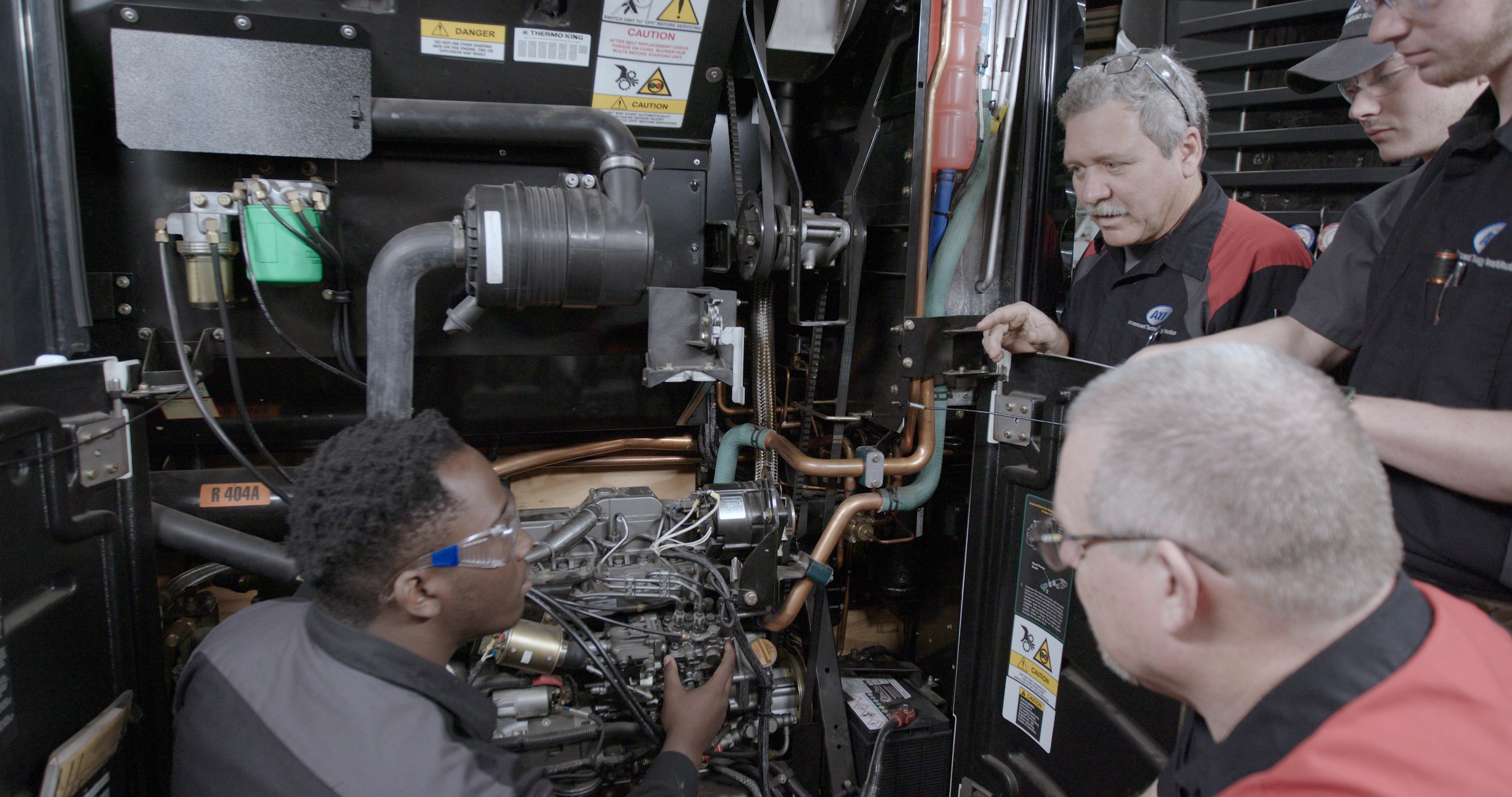Mastering the craft of heavy diesel mechanics can unlock numerous opportunities. With the global transportation industry estimating a growth of 6% over the next decade, skilled mechanics are in high demand. This journey begins with a solid apprenticeship.
Starting a heavy diesel mechanic apprenticeship program involves a blend of formal education and hands-on training. In the 1970s, these programs became more structured, emphasizing both classroom instruction and real-world application. Aspiring mechanics often find the combination of these elements to be a highly effective method for skill acquisition.

Essential Requirements for Starting a Heavy Diesel Mechanic Apprenticeship
To begin a heavy diesel mechanic apprenticeship, a high school diploma or GED is typically required. Classes in mathematics, physics, and mechanical drawing provide a solid foundation. These subjects help in understanding the technical aspects of the trade. Some programs may also require a clean driving record. This is because test-driving vehicles is often part of the job.
Physical strength and stamina are essential for this line of work. Many tasks involve heavy lifting and working in challenging environments. Good hand-eye coordination is also crucial. Additionally, having strong problem-solving skills is beneficial. Apprentices often diagnose and repair complex mechanical issues.
Basic knowledge of diesel engines and machinery will give you an edge. Reading technical manuals and understanding schematics are part of the daily routine. An early exposure to tools and engines can be advantageous. Enthusiasm and a willingness to learn are equally important. The apprenticeship is a continuing education process.
Finally, securing a sponsorship from a registered employer is a must. Employers often partner with schools to provide this training. This setup ensures that apprentices receive comprehensive instruction. It also allows for hands-on experience in real-world settings. Employers look for committed and eager candidates.
Understanding the Educational and Skill Prerequisites
Before starting a heavy diesel mechanic apprenticeship, having a high school diploma or GED is crucial. These educational credentials ensure you possess basic literacy and numeracy skills. High school courses in subjects like mathematics, physics, and shop classes are particularly beneficial. They lay the groundwork for understanding complex mechanical systems. Additionally, English classes help with absorbing technical manuals.
Beyond formal education, certain skills are highly beneficial for aspiring heavy diesel mechanics. Hands-on experience with tools and machinery, even at a basic level, is advantageous. This exposure helps in developing an intuitive understanding of how machines work. Problem-solving abilities are also essential. Mechanics diagnose and fix issues under time pressure.
Soft skills are equally important in this field. Communication and teamwork are key, especially when collaborating with other mechanics or explaining problems to clients. Attention to detail cannot be overstated. The ability to spot small issues before they become major problems can save time and resources. A strong work ethic and dedication to learning are critical for success.
For those interested in gaining more practical knowledge, online courses and certifications are available. Websites like Udemy offer relevant courses. These can supplement your formal education and skill set. Enrolling in workshops and professional training programs also adds value. Continuous learning helps keep up with advancements in diesel technology.
Identifying Apprenticeship Opportunities
Finding the right apprenticeship opportunity is essential for a successful career as a heavy diesel mechanic. One effective way to start is by contacting local trade schools and technical colleges. Many of these institutions have partnerships with companies that offer apprenticeships. They can provide valuable information on available programs. Additionally, attending career fairs can be fruitful.
Online job boards are another useful resource. Websites like Indeed and LinkedIn list apprenticeship openings regularly. It’s important to set up notifications to stay updated on new opportunities. Networking within the industry can also lead to potential apprenticeships. Sometimes, word-of-mouth referrals can connect you to hidden opportunities.
Industry associations and unions often have apprenticeship programs as well. Organizations like the National Institute for Automotive Service Excellence (ASE) provide valuable resources. They offer guidance on how to enter the field. These associations may also offer scholarships or funding options. Participating in their events and workshops can enhance your knowledge and skills.
Local employers are another key source for apprenticeships. Companies that offer heavy diesel services often seek apprentices to train. It’s advisable to directly contact these companies. Sending out resumes and covering letters to express your interest can make a significant impact. Persistence and passion go a long way in securing opportunities.
Navigating the Application Process
Applying for a heavy diesel mechanic apprenticeship can seem daunting, but breaking it down into steps can help. The first step is to gather all necessary documents. This typically includes your high school diploma or GED, a resume, and any relevant certifications. Make sure your resume highlights any related coursework or hands-on experience. Tailor it to emphasize skills pertinent to diesel mechanics.
Next, you’ll need to fill out the application forms carefully. Many apprenticeship programs have detailed application requirements. Some may ask for an essay or personal statement. This is a chance to express your passion for the field. Be honest and specific about why you want to become a heavy diesel mechanic.
After submitting your application, prepare for the interview process. This may include multiple rounds of interviews with different team members. Practice common interview questions and answers. Focus on your technical skills as well as your ability to work in a team. Show enthusiasm and a willingness to learn.
Some programs may require you to take an aptitude test. These tests assess your mechanical knowledge and logical thinking skills. Studying basic mechanics and technical principles can be beneficial. Review sample tests if they are available. Doing well on these tests can significantly boost your application.
Finally, follow up on your application after submission. Send a thank-you email to the interviewers to express gratitude for the opportunity. This shows professionalism and eagerness. If you haven’t heard back in a few weeks, consider sending a polite follow-up email. Persistence can sometimes make a difference in competitive programs.
Maximizing the Apprenticeship Experience
Diving into a heavy diesel mechanic apprenticeship, it’s essential to make the most of every opportunity. Be proactive in seeking out challenging tasks. Don’t hesitate to ask questions. This not only helps you learn faster but also shows your enthusiasm. Supervisors appreciate apprentices who show initiative.
Building strong relationships with mentors and colleagues enriches the learning experience. These connections can provide valuable insights and guidance. Networking within your workplace can lead to future job opportunities. Attend any offered workshops or additional training sessions. These will expand your skill set and knowledge base.
Documenting your work and learning can significantly benefit you. Keep a journal of what you learn each day. Record the different tasks you’ve completed and any challenges you faced. This not only helps in retaining knowledge but is also a great reference. It can be useful for future job applications.
Set personal goals throughout your apprenticeship. These might include mastering specific tools or completing certain projects. Regularly assess your progress against these goals. Adjust them as needed to keep pushing yourself. Achieving these milestones can bring a sense of accomplishment.
Being adaptable and open to feedback is crucial. Constructive criticism helps you grow professionally. Take feedback seriously and work on improving your skills. View mistakes as learning opportunities. This approach will help you become a competent and confident mechanic.
Lastly, stay updated with industry changes and advancements. The field of heavy diesel mechanics is constantly evolving. Subscribe to industry journals and attend relevant conferences. This will keep you informed about new technologies and best practices. Staying updated ensures you remain competitive in the job market.
Next Steps After Completing the Apprenticeship
Once you have completed your heavy diesel mechanic apprenticeship, it’s time to consider your next steps. One option is to seek full-time employment. Many apprenticeships lead to job offers from the sponsoring company. If not, use your network and job boards to find openings. Highlight your hands-on experience and skills in your applications.
Continuing education is another valuable step. Consider enrolling in advanced courses to specialize further. Certifications from organizations like the National Institute for Automotive Service Excellence (ASE) are highly regarded. They can enhance your resume and open more job opportunities. Look for local or online courses to find what suits you best.
Another path is to explore different sectors within the heavy diesel industry. Some mechanics focus on specific types of engines or machinery. Others might work in various settings like construction, agriculture, or transportation. Understanding the different sectors can help you choose a focus area. Specialized expertise can make you more marketable in the long run.
Starting your own business is also a possibility. If you feel confident in your skills and experience, consider becoming an independent contractor. This route offers the freedom to choose your projects and clients. However, it also requires strong business acumen and marketing skills. Research the requirements and seek advice from other mechanics who have gone this route.
Finally, stay updated with industry trends and technologies. As a heavy diesel mechanic, continuous learning is crucial. Subscribe to industry publications and join professional associations. Participate in workshops and seminars. Keeping up with new developments will ensure you remain competitive and effective in your career.

Final Thoughts on Starting a Heavy Diesel Mechanic Apprenticeship
Embarking on a heavy diesel mechanic apprenticeship is a significant step towards a rewarding career. By understanding the educational prerequisites, identifying opportunities, and navigating the application process, you set a solid foundation. Maximizing the apprenticeship experience ensures you gain the necessary skills. These steps lead to a successful future in the industry.
After completing your apprenticeship, numerous paths open up. Whether you seek full-time employment, continue your education, or start your own business, staying updated and adaptable is key. The journey is challenging but ultimately rewarding. Stay committed, keep learning, and embrace the opportunities ahead.




Leave a Reply